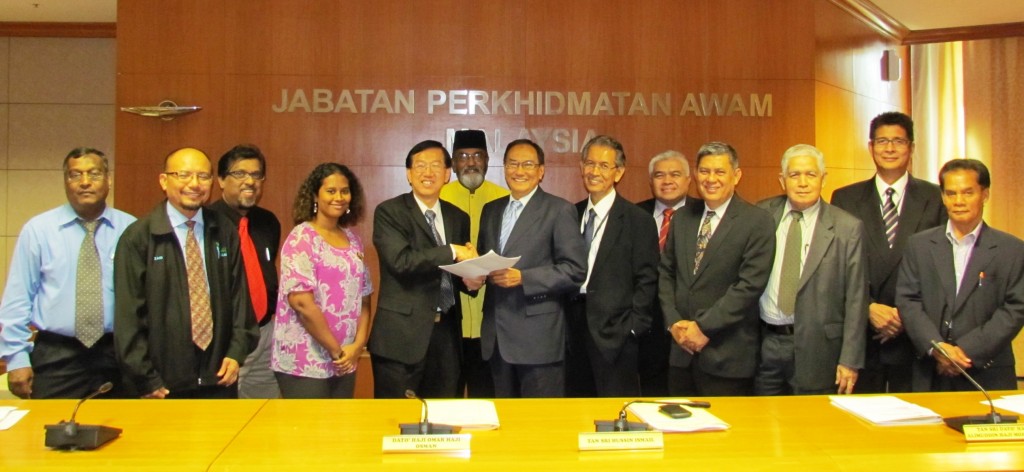Gabungan Bertindak Malaysia (GBM), a coalition of 24 non-governmental organisations, had held a special two hour meeting with the members of Suruhanjaya Khas Mengkaji Transformasi Perkhidmatan Awam (SKMTPA) at Putrajaya this month and GBM had made proposals to SKMTPA on the transformation and reform of the public service.
The delegation was led by the Chairman of GBM, Tan Yew Sing who is also the President of the KL & Selangor Chinese Assembly Hall (KLSCAH) together with Zaid Kamaruddin, Vice-Chair of GBM cum Secretary General of Pertubuhan IKRAM Malaysia (IKRAM), Ragahavan A/L Annamalai, Treasurer of GBM cum 2nd Vice President of Tamil Foundation Malaysia (TF); and three Committee Members of GBM namely, Prematilaka KD Serisena, Hon Secretary General of Majlis Perundingan Malaysia Agama Buddha, Kristian, Hindu, Sikh dan Tao (MPMA-BKHT), Dato Thasleem, Chair of National Indian Rights Action Team (NIAT) and Lena Hendry, Non-Discrimination Programme Officer of KOMAS. They met with YBhg. Tun Dato’ Zaki bin Tun Azmi, Chair of the SKMTPA.
The other six SKMTPA members who were present were former Director General of Public Service, Tan Sri Ismail Adam; former Director General of Education Malaysia, Tan Sri Dato’ Haji Alimuddin bin Haji Mohd Dom; former Auditor General, Tan Sri Dr. Hadenan bin A. Jalil; former Deputy Chief of Police, Tan Sri Hussin bin Ismail; former Chief of Army Training, Mej. Jen. Dato’ Paduka Che Hasni bin Che Ahmad and President CUEPACS, Dato’ Omar bin Osman.
Tan Yew Sing welcomed the government’s initiative of setting up SKMPTA to transform and reform the public service. On behalf of GBM, he presented the GBM’s proposal entitled, “FOSTERING A WORLD CLASS MALAYSIAN CIVIL SERVICE” to SKMPTA during the meeting. The GBM’s Proposal comprising of seven recommendations suggesting rightsizing of the public service, recruitment for a balanced racial mix of civil service, review of the promotional system, combat and elimination of corruption, curtailing of political interference and striving to achieve a world class public service.
The above seven key GBM reforms required to revitalize the public service are:
(1) To build a more inclusive public service including police and military;
(2) Right-sizing the public service;
(3) To review and reform the promotional system based on meritocracy;
(4) To strive for competency and professionalism;
(5) To enhance public scrutiny and public service accountability;
(6) To fight and eliminate corruption at all levels of the public service;
(7) To curtail political interference in the public service.
Both parties deliberated at length on issues relating to recruitment of a multi-ethnic public service, its competency, professionalism, combating and elimination of corruption and mal-practices. Zaki expressed that the public service should be multi-ethnic and SKMPTA intended to recommend to the Government to recruit more non-Malay civil servants. He added that the challenges faced by the Government included how to attract non-Malays into the public service, how to encourage Malays to move outside public sector and work in private section especially Chinese enterprises and also how to encourage private entrepreneurs to hire Malays.
The GBM’s delegation team pointed out that in accordance with the regional and international standards on ratio of civil servants and population, the current Malaysian public service was considerably oversized, resulting in low efficiency and if we did not implement an immediate “downsizing” plan, economic growth and development would be affected. GBM delegate also reckoned that the remuneration system of public service should be reformed thoroughly and be based on meritocracy.
Tan Yew Sing opined that in order to reduce the number of the civil servants effectively and encourage the existing public servants to leave the public service voluntarily, the Government should put in place a special scheme of entrepreneurship training for those public servants interested to join the private sector and also providing financial assistance in accordance with their competency. The Government should also offer reasonable compensation to those long serving public servants. He suggested to the Government to collaborate with the Chinese organisations/companies to jointly orgainse entrepreneurship training and internship programmes and also to make appropriate arrangement to assist public servants to move and work in private sectors. As there are also many Malay entrepreneurs in the market, and they too could assist to offer such programmes and opportunities to civil servants, helping them to start from the basic rather than giving them crutches. Zaki fully agreed to this suggestion.
Anyway, there are examples of successful government machinery reform; eg the passport departments. Ten years ago, it took at least a month, if not more, to renew a passport. Today, it takes only 3 hours. Great compliment should be extended to this department for upgrading its service impressively and efficiently. Tan Yew Sing also expressed that in order to provide better service, the public service front counters should include diverse ethnic public servants who could speak different languages and are sensitive towards the needs of the public. The placement of public servants to various positions should reflect their strength ensuring better services and efficiency. Zaik also pointed out that over the years efficiency of the judiciary service has also greatly improved.
GBM team further suggested that the Malaysian Anti-Corruption Commission should learn from the Independent Commission Against Corruption (ICAC) of Hong Kong, Singapore and Taiwan. Zaki expressed that the Government has been in contact with the respective anti-corruption authorities of the above countries to study those anti-corruption tactics and strategies suitable for our country.
Tan Yew Sing (fifth from the left) hand over the proposal entitled “FOSTERING A WORLD CLASS MALAYSIAN CIVIL SERVICE” to Zaki (fifth from the right). From left to right: Raghavan Annamalai, Zaid Kamaruddin, Prematilaka KD Serisena, Thasleem, Ismail Adam, Che Hasni Che Ahmad, Alimuddin Mohd Dom, Hadenan A. Jalil, Husin Ismail and Omar Osman.

 中文
中文 BM
BM